Results
-
 £76.00
£76.00You Can't Hurry Love - Lamond Dozier
Estimated dispatch 5-14 working days
-
 £30.20
£30.20Skidaddle (Brass Band) Barrie Gott
Skidaddle will be the perfect item to provide a lighter moment in your band's programme. The composer Barrie Gott writes: ''Skidaddle' literally means to move in a hurry. This piece means exactly that - to get moving. I was experimenting at the piano at school one morning waiting for my first students and this little ditty came to mind. Four hours later I had the first draft done! It is supposed to be a bit of fun with a few technical demands for cornet and euphonium in particular. The semi-quaver (sixteenth) work needs to be precise. Try and get the audience involved and they'll be yours for the larger works on the programme.' Difficulty Level: 1st Section + Sheet music available from: UK - www.brassband.co.uk USA - www.solidbrassmusic.com Instrumentation: Soprano Cornet Eb Solo Cornet Bb Repiano Cornet Bb 2nd Cornet Bb 3rd Cornet Bb Flugel Horn Bb Solo Horn Eb 1st Horn Eb 2nd Horn Eb 1st Baritone Bb 2nd Baritone Bb 1st Trombone Bb 2nd Trombone Bb Bass Trombone Euphonium Bb Bass Eb Bass Bb Timpani Drum Set Xylophone
In Stock: Estimated dispatch 1-3 working days
-
 £54.99
£54.99Inner Space - John Emerson Blackstone
Today's society means to many people: bustle, hurry, quick and more ... No wonder that many are looking for (inner) tranquility and balance in their overloaded existence. Listen to music or active music is a way to relax and also to draw new energy. The repetitive motifs in Innerspace provide a relaxing effect. Enjoy and use the strength of your own 'innerspace'.
Estimated dispatch 5-14 working days
-
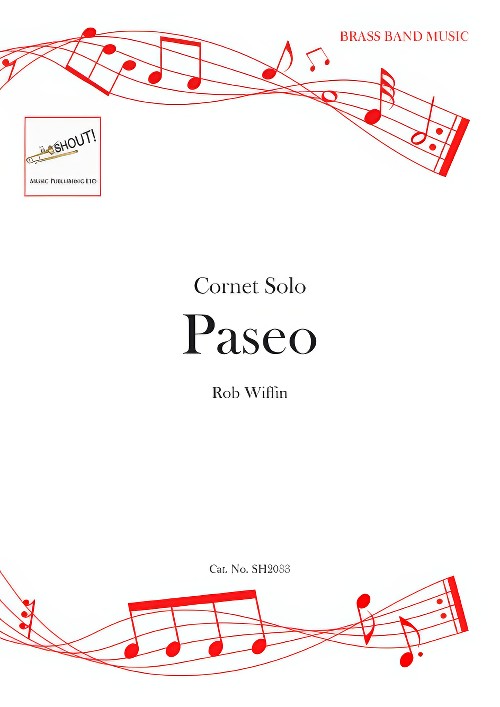 £26.95
£26.95Paseo (Cornet Solo with Brass Band - Score and Parts) - Wiffin, Rob
A gentle solo for cornet with band accompaniment.Paseo is a Spanish word for a leisurely walk or stroll. The soloist takes the musical line for a walk with no great sense of hurry. There is one moment where the pleasantness of the stroll is threatened but it quickly passes and the good mood is resumed. Technically this needs a good sense of cantabile and control over the range from low D to D two octaves higher. In order to allow the soloist to sing through without fighting the accompaniment, cornets and percussion are omitted.Duration: 4.15
Estimated dispatch 7-14 working days
-
 £37.95
£37.95Benvenuto Cellini (Brass Band - Score only) - Berlioz, Hector - Wright, Frank
Berlioz's opera Benvenuto Cellini was first produced in Paris in 1838 but was withdrawn as a failure, and it was not until the production in Dresden in 1888 that it was finally acclaimed by the Germans as a triumph. Adapted from certain episodes recorded in the memoirs of Benvenuto Cellini, Tuscan sculptor and goldsmith, the story, laid in Rome during the mid-sixteenth century, is not strictly historical. The short opening Allegro, marked deciso con impeto, is conceived in the most brilliant Berlioz manner, utilising full instrumentation. In the Larghetto we meet at once the first of the opera themes - the Cardinal's aria (from the last act) introduced in the bass, quasi pizzicato. A second melody leads to a resumption of the Allegro, the contrasting second subject in the tenor horns being an adaptation of Teresa's aria (Act I). Towards the end the Cardinal theme is re-introduced by trombones, fortissimo against an energetic cornet and euphonium passage (senza stringendo - without hurry, says the score). After a unison passage storming skywards, there is a sudden, dramatic three-bar silent pause broken by Eb basses alone, again stating the Cardinal theme. A simple molto crescendo on the dominant, begun piano, leads to the long, resounding chord.
Estimated dispatch 7-14 working days
-
 £82.95
£82.95Benvenuto Cellini (Brass Band - Score and Parts) - Berlioz, Hector - Wright, Frank
Berlioz's opera Benvenuto Cellini was first produced in Paris in 1838 but was withdrawn as a failure, and it was not until the production in Dresden in 1888 that it was finally acclaimed by the Germans as a triumph. Adapted from certain episodes recorded in the memoirs of Benvenuto Cellini, Tuscan sculptor and goldsmith, the story, laid in Rome during the mid-sixteenth century, is not strictly historical. The short opening Allegro, marked deciso con impeto, is conceived in the most brilliant Berlioz manner, utilising full instrumentation. In the Larghetto we meet at once the first of the opera themes - the Cardinal's aria (from the last act) introduced in the bass, quasi pizzicato. A second melody leads to a resumption of the Allegro, the contrasting second subject in the tenor horns being an adaptation of Teresa's aria (Act I). Towards the end the Cardinal theme is re-introduced by trombones, fortissimo against an energetic cornet and euphonium passage (senza stringendo - without hurry, says the score). After a unison passage storming skywards, there is a sudden, dramatic three-bar silent pause broken by Eb basses alone, again stating the Cardinal theme. A simple molto crescendo on the dominant, begun piano, leads to the long, resounding chord.
Estimated dispatch 7-14 working days
-
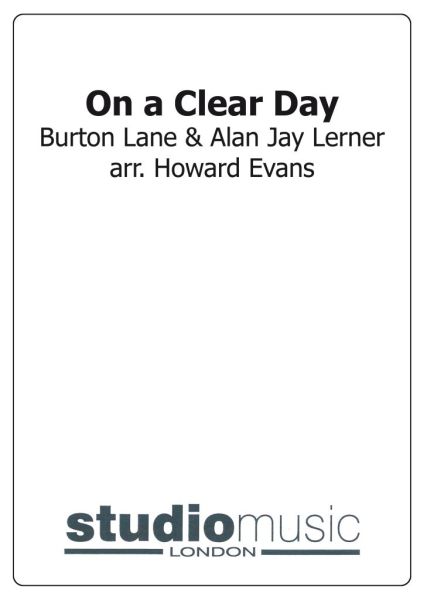 £44.95
£44.95On a Clear Day
Includes: On a Clear Day; Hurry! It's Lovely up Here!; Melinda; Come Back to Me.
Estimated dispatch 7-14 working days
-
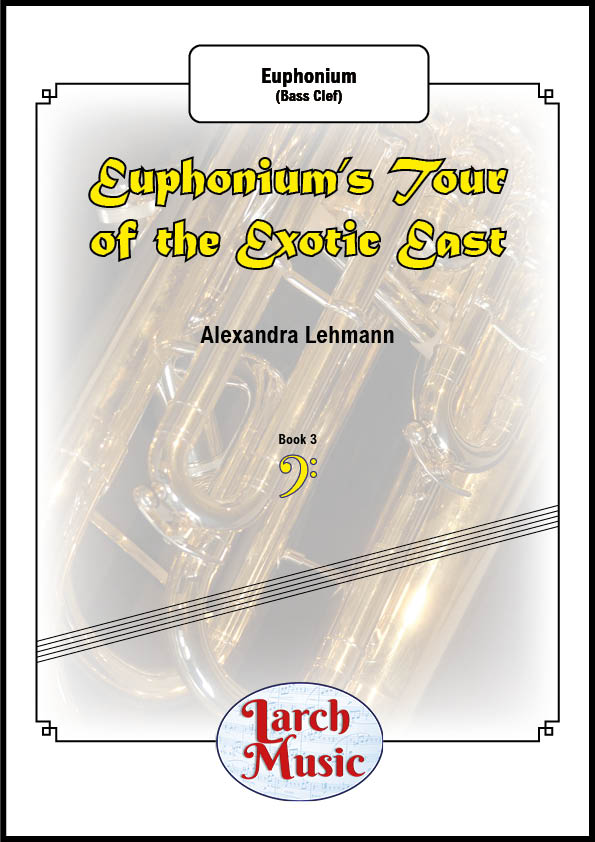 £9.95
£9.95Euphonium's Tour of The Exotic East - Solo Euphonium (Bass Clef) - LM173
COMPOSER: Alexandra LehmannEuphonium's Tour of The Exotic EastThe year 2020 will be infamously recorded as a time when musicians had to lead a solitary life, which is incompatible with musical activity.1. Dynamic Dabkeh DanceEuphoniumplays for a 'Dynamic Dabkeh Dance' in the Levant,where dancers dance energetically in a circle to celebrate a wedding.2. Slithering Snake Charmer's Sinuous ChantEuphoniumplays a 'Sinuous chant for a Slithering Snake' as asnake-charmer in the Indian subcontinent.The slithering snake undulates in response to the raga-infused melody.3. Merry MadagascarEuphoniumtravels south-east to the island of Madagascarwhere here is a village harvest Carnival,with much merriment and communal music.4. Lively and Luxurious Lion DanceFurther north,Euphonium participates in the Far Easternlively and luxurious Lion Dance to bring good luck and fortune.5. Indonesian GamelanEuphoniummust hurry to Indonesia where there is anIndonesian Gamelan puppet whole-tone scale musical performance,with chiming large gongs, and fast clattering metallophones.6. Polynesian PartyEuphoniumtakes the boat to the Polynesian Islandsto play at a Party celebrating the sea.7. Anthem to the ChrysanthemumFinally,Euphonium goes up north again and plays homagewith an Anthem to the mystical Chrysanthemum with a pentatonic melody representing happiness, love, longevity, nobility, and joy.
In Stock: Estimated dispatch 3-5 working days
-
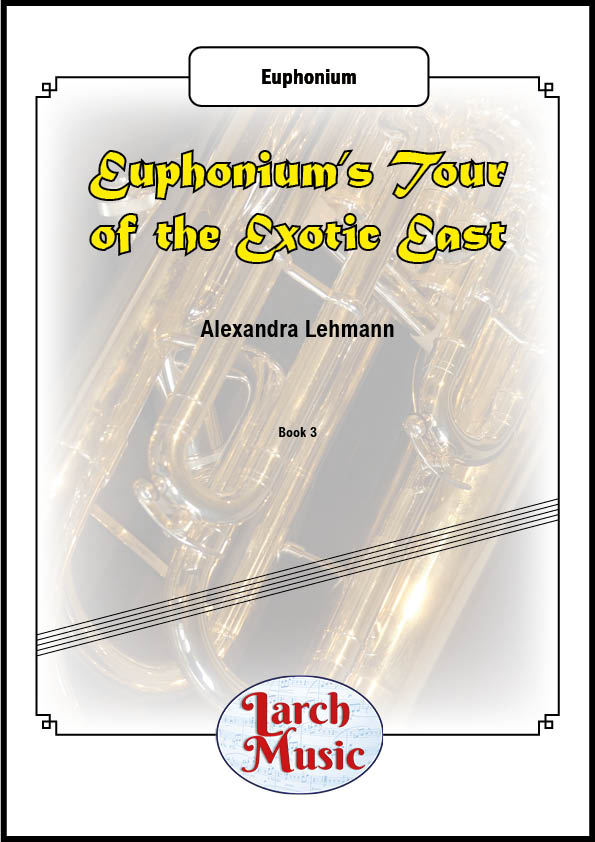 £9.95
£9.95Euphonium's Tour of The Exotic East - Solo Euphonium (Treble Clef) - LM170
COMPOSER: Alexandra LehmannEuphonium's Tour of The Exotic EastThe year 2020 will be infamously recorded as a time when musicians had to lead a solitary life, which is incompatible with musical activity.1. Dynamic Dabkeh DanceEuphoniumplays for a 'Dynamic Dabkeh Dance' in the Levant,where dancers dance energetically in a circle to celebrate a wedding.2. Slithering Snake Charmer's Sinuous ChantEuphoniumplays a 'Sinuous chant for a Slithering Snake' as asnake-charmer in the Indian subcontinent.The slithering snake undulates in response to the raga-infused melody.3. Merry MadagascarEuphoniumtravels south-east to the island of Madagascarwhere here is a village harvest Carnival,with much merriment and communal music.4. Lively and Luxurious Lion DanceFurther north,Euphonium participates in the Far Easternlively and luxurious Lion Dance to bring good luck and fortune.5. Indonesian GamelanEuphoniummust hurry to Indonesia where there is anIndonesian Gamelan puppet whole-tone scale musical performance,with chiming large gongs, and fast clattering metallophones.6. Polynesian PartyEuphoniumtakes the boat to the Polynesian Islandsto play at a Party celebrating the sea.7. Anthem to the ChrysanthemumFinally,Euphonium goes up north again and plays homagewith an Anthem to the mystical Chrysanthemum with a pentatonic melody representing happiness, love, longevity, nobility, and joy.
In Stock: Estimated dispatch 3-5 working days
-
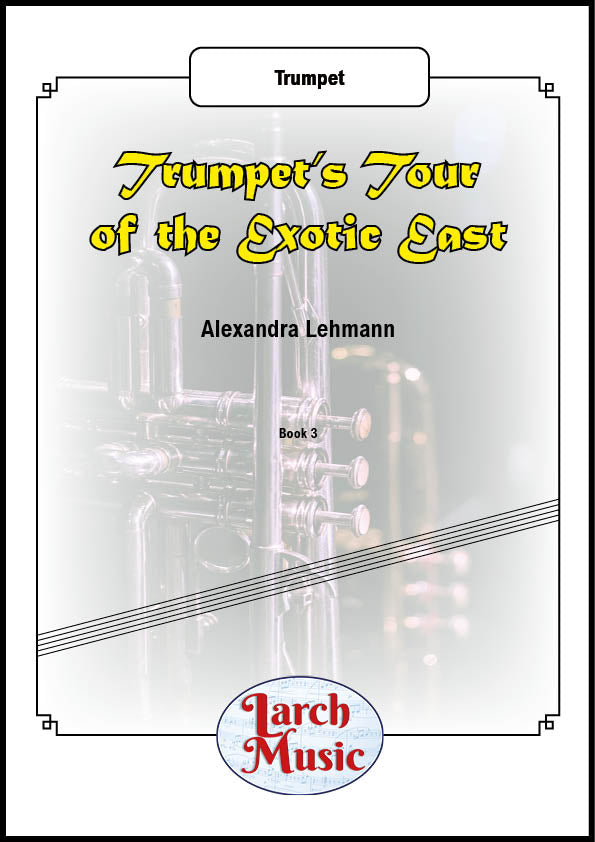 £9.95
£9.95Trumpet's Tour of The Exotic East - Solo Trumpet - LM188
COMPOSER: Alexandra LehmannTrumpet's Tour of The Exotic EastThe year 2020 will be infamously recorded as a time when musicians had to lead a solitary life, which is incompatible with musical activity.1. Dynamic Dabkeh DanceTrumpetplays for a 'Dynamic Dabkeh Dance' in the Levant,where dancers dance energetically in a circle to celebrate a wedding.2. Slithering Snake Charmer's Sinuous ChantTrumpetplays a 'Sinuous chant for a Slithering Snake' as asnake-charmer in the Indian subcontinent.The slithering snake undulates in response to the raga-infused melody.3. Merry MadagascarTrumpettravels south-east to the island of Madagascarwhere here is a village harvest Carnival,with much merriment and communal music.4. Lively and Luxurious Lion DanceFurther north,Trumpet participates in the Far Easternlively and luxurious Lion Dance to bring good luck and fortune.5. Indonesian GamelanTrumpetmust hurry to Indonesia where there is anIndonesian Gamelan puppet whole-tone scale musical performance,with chiming large gongs, and fast clattering metallophones.6. Polynesian PartyTrumpettakes the boat to the Polynesian Islandsto play at a Party celebrating the sea.7. Anthem to the ChrysanthemumFinally,Trumpet goes up north again and plays homagewith an Anthem to the mystical Chrysanthemum with a pentatonic melody representing happiness, love, longevity, nobility, and joy.
In Stock: Estimated dispatch 3-5 working days



